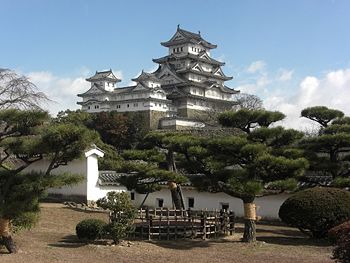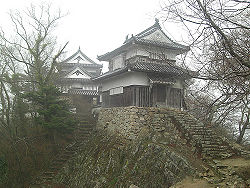Castles in Japan: Difference between revisions
imported>Richard Nevell (While surviving castles in Europe are universally stone-built, many that do not survive were timber structures) |
imported>Roger A. Lohmann m (Correct syntax) |
||
| Line 1: | Line 1: | ||
{{subpages}} | {{subpages}} | ||
[[Image:Himeji Castle.jpg|right|thumb|350px|Sixteenth-century [[Himeji Castle]] is a [[UNESCO]] [[World Heritage site]]; unusually for [[Japan]], the castle is built of wood rather than stone. In the foreground is one of 33 wells.]] | [[Image:Himeji Castle.jpg|right|thumb|350px|Sixteenth-century [[Himeji Castle]] is a [[UNESCO]] [[World Heritage site]]; unusually for [[Japan]], the castle is built of wood rather than stone. In the foreground is one of 33 wells.]] | ||
'''[[Castle]]s in [[Japan]]''', as in other countries, were built as defensible fortifications, usually to protect the interests of a local lord. Today, many Japanese towns and cities incorporate a castle or the ruins of one into their modern-day design. Sometimes such castles are not quite what they seem: for example, the one in the city of [[Okayama (city)|Okayama]] (岡山) is a replica housing a museum, situated next to the foundations of the original castle, which was destroyed in [[World War II]] [[incendiary bomb|firebombing]]. Another representative example is [[Morioka]] (盛岡), a city which includes a castle site comprising only ruins | '''[[Castle]]s in [[Japan]]''', as in other countries, were built as defensible fortifications, usually to protect the interests of a local lord. Today, many Japanese towns and cities incorporate a castle or the ruins of one into their modern-day design. Sometimes such castles are not quite what they seem: for example, the one in the city of [[Okayama (city)|Okayama]] (岡山) is a replica housing a museum, situated next to the foundations of the original castle, which was destroyed in [[World War II]] [[incendiary bomb|firebombing]]. Another representative example is [[Morioka]] (盛岡), a city which includes a castle site comprising only ruins. Today it is a park. | ||
Japanese castles were typically constructed of wood, though an exception is [[Himeji Castle]] (姫路城 ''Himeji-joo''), which was also built with [[fire]]proof plaster.<ref>''Himeji Castle'': '[http://www.himeji-castle.gr.jp/index/English Virtual Tour - Himeji Castle]'.</ref> It is also notable for its maze of pathways designed to confuse invaders. The castle comprises 83 buildings, and also includes 33 wells in its grounds - one of which attracts many visitors with a [[ghost]]ly tale of murder and haunting. | Japanese castles were typically constructed of wood, though an exception is [[Himeji Castle]] (姫路城 ''Himeji-joo''), which was also built with [[fire]]proof plaster.<ref>''Himeji Castle'': '[http://www.himeji-castle.gr.jp/index/English Virtual Tour - Himeji Castle]'.</ref> It is also notable for its maze of pathways designed to confuse invaders. The castle comprises 83 buildings, and also includes 33 wells in its grounds - one of which attracts many visitors with a [[ghost]]ly tale of murder and haunting. | ||
Revision as of 13:09, 3 September 2020

Castles in Japan, as in other countries, were built as defensible fortifications, usually to protect the interests of a local lord. Today, many Japanese towns and cities incorporate a castle or the ruins of one into their modern-day design. Sometimes such castles are not quite what they seem: for example, the one in the city of Okayama (岡山) is a replica housing a museum, situated next to the foundations of the original castle, which was destroyed in World War II firebombing. Another representative example is Morioka (盛岡), a city which includes a castle site comprising only ruins. Today it is a park.
Japanese castles were typically constructed of wood, though an exception is Himeji Castle (姫路城 Himeji-joo), which was also built with fireproof plaster.[1] It is also notable for its maze of pathways designed to confuse invaders. The castle comprises 83 buildings, and also includes 33 wells in its grounds - one of which attracts many visitors with a ghostly tale of murder and haunting.
Another notable fortress is the fourteenth-century Bitchu-Matsuyama[2] Castle (備中松山城 Bitchuu-Matsuyama-joo) in Okayama prefecture (岡山県 Okayama-ken), which is the highest castle above sea level in Japan. It sits at 1,575 feet (480m), above the town of Takahashi (高梁).[3]
Footnotes
- ↑ Himeji Castle: 'Virtual Tour - Himeji Castle'.
- ↑ Bitchu (備中 Bitchuu) was the name of an old Japanese province.
- ↑ Guide to Japanese Castles: 'Bitchu Matsuyama Castle'.
